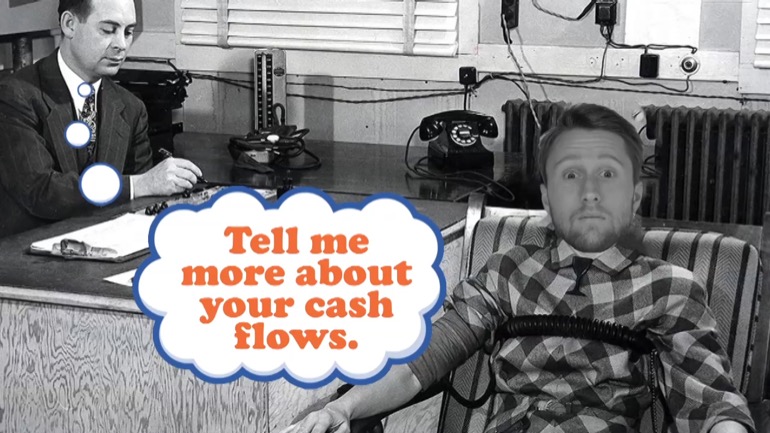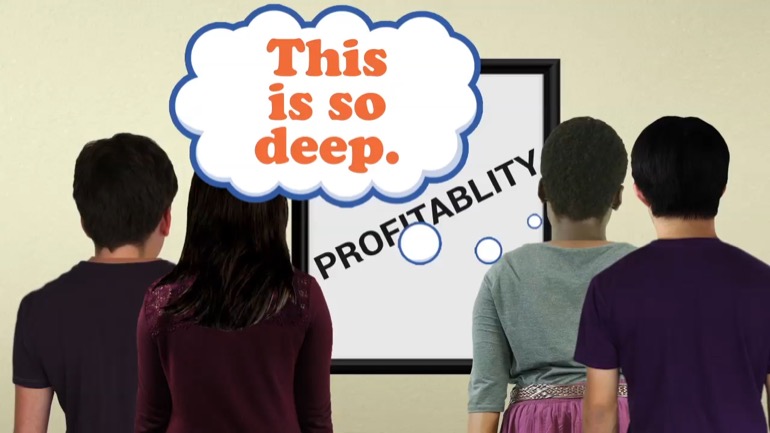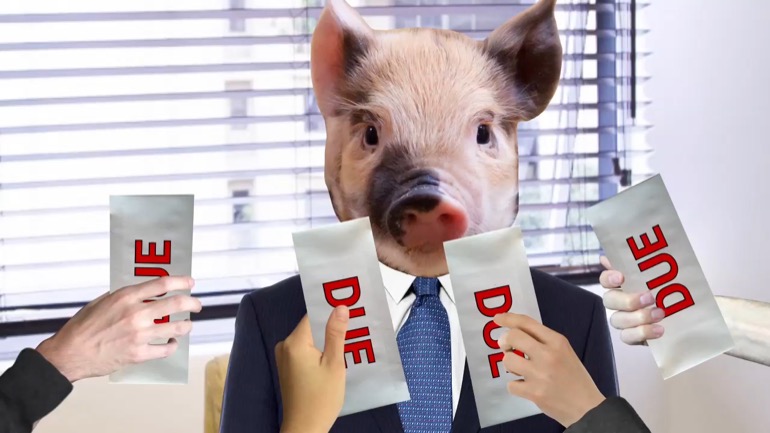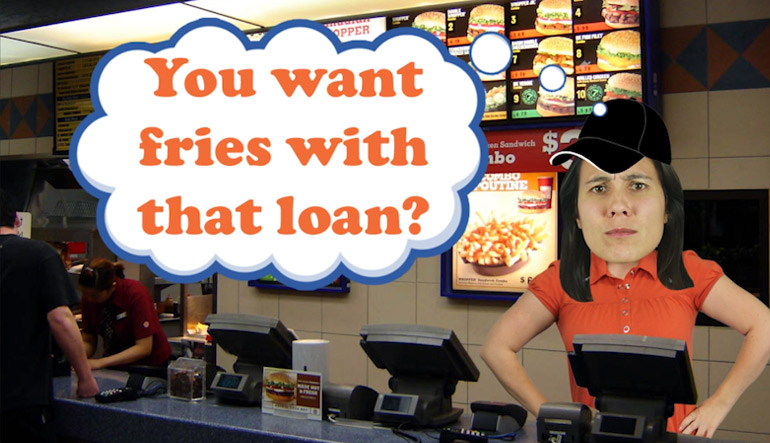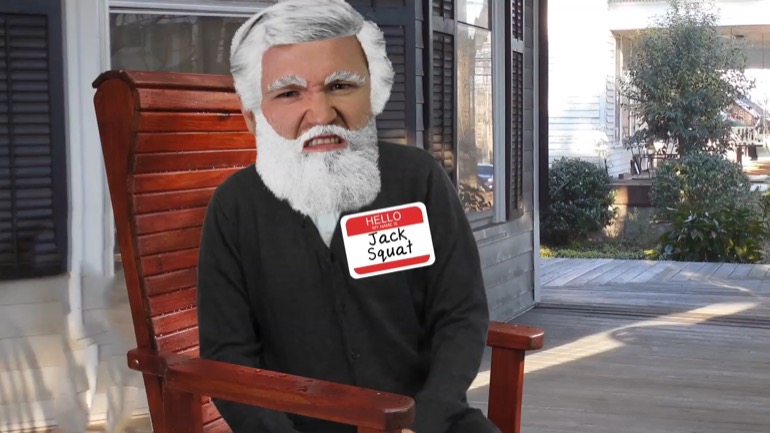ShmoopTube
Where Monty Python meets your 10th grade teacher.
Search Thousands of Shmoop Videos
Principles of Finance Videos 166 videos
How is a company... born? Can it be performed via C-section? Is there a midwife present? Do its parents get in a fight over what to name it? In thi...
Company Formation, Structure, and Inception: Unit Intro. Sorry, Leo DiCaprio fans—we're not going to be breaking down the plot of Inception. We'r...
Okay, so you want to be a company financial manager. It's basically up to you to make money for the shareholders. It would also be swell if you mad...
Principles of Finance: Unit 3, Tax Deduction Math 4 Views
Share It!
Description:
How do corporate tax deductions work? Like... what sort of expenses can they deduct, and for how much? Paging Uncle Sam...
Transcript
- 00:00
principles of finance a la shmoop. tax deduction math. alright with this
- 00:07
light introduction to taxes let's work through a corporate leverage problem. [girl holds tax textbook in school hallway]
- 00:12
sounds fun you know to the guys in thick glasses in the front row. and here's our
- 00:16
lemonade stands our US company, a wildly successful decade later.
- 00:21
all right the company has in our very theoretical example here no cash and no
Full Transcript
- 00:26
debt. you the wily CEO wonder gee whiz what if we bought lemonade lovers for
- 00:33
fifteen billion we'd be really big we'd get cheaper prices for our cups and
- 00:38
sugar and rent and be the brand in lemonade. well because you took this
- 00:43
course on Finance from your fine loving people at shmoop here you can easily do
- 00:48
the math. pro forma doesn't mean you get paid making a living as a former. pro
- 00:53
forma means combined. so all this would be great if you could use a high [pro forma explained]
- 00:58
multiple stock of your own to buy them. but your stock trades at only ten times
- 01:02
earnings and to be bought they want 20 times their earnings .you would suffer
- 01:07
huge dilution if you used your own stock. if you pay cash well they'll take a
- 01:12
lower multiple. 15 ish times earnings well cash always has less risk obviously
- 01:17
than stock, so you try to figure out how you can raise fifteen billion dollars of
- 01:22
cash. we've been through the basics of Investment Banking 101, but here the
- 01:26
focus is on free cash flow and debt repayment. so let's dream a little dream
- 01:31
and say we borrow all fifteen billion dollars in cash. well some idiot or
- 01:36
visionary is willing to loan us all that money for the leveraged buyout of
- 01:41
lemonade lovers and charge us five percent interest on the loan. yes we are
- 01:46
massively simplifying here. Throeau has nothing on us. quick math tells us that [Henry David Thoreau pictured]
- 01:51
five percent interest on fifteen billion dollars is seven hundred fifty million
- 01:55
dollars a year of interest. but that interest will shrink as we pay down our
- 01:59
principal, right? and we know that if we can swing year one and start to really
- 02:04
pay down that principal, well this LBO for leveraged buyout should work great.
- 02:09
so let's look at year one right here well look how different things compare
- 02:12
here with the first iteration with no debt. in the no debt scenario we were
- 02:18
paying 420 million dollars in taxes. now we're paying just a hundred ninety five
- 02:24
million, because interest is deductible from taxes. the government essentially
- 02:29
split our interest costs with us. nice of them and in doing so it made the LBO [uncle sam asks for more taxes]
- 02:33
work mathematically. you can assume that most of the net income of four hundred
- 02:38
fifty five million there is free cash, and our lemonade business has very
- 02:42
little capital expenditures which would cloud the net income a versus free cash
- 02:46
flow story, so in year one we can take say four hundred million dollars of our
- 02:51
free cash and pay down our debt principle to just fourteen point six
- 02:56
billion. well in year two with less principle to pay down our interest
- 03:00
expenses go down, and by year five we're sitting pretty fat and happy even
- 03:04
assuming no growth or additional synergies from the merger that we just
- 03:08
did here it's an acquisition, and note that we only included a relatively small
- 03:13
expense savings of two hundred million dollars by way of being able to buy our [spreadsheet showing expenses before and after merger]
- 03:16
supplies a bit cheaper with huge wal-mart like scale and the lemonade biz.
- 03:21
it's likely that there are more savings we'll be able to find and more revenue
- 03:25
growth opportunities to be had as well. [fizzy lemonade next to regular lemonade pictured on a shelf]
Related Videos
GED Social Studies 1.1 Civics and Government
What is bankruptcy? Deadbeats who can't pay their bills declare bankruptcy. Either they borrowed too much money, or the business fell apart. They t...
What's a dividend? At will, the board of directors can pay a dividend on common stock. Usually, that payout is some percentage less than 100 of ear...
How are risk and reward related? Take more risk, expect more reward. A lottery ticket might be worth a billion dollars, but if the odds are one in...



















































